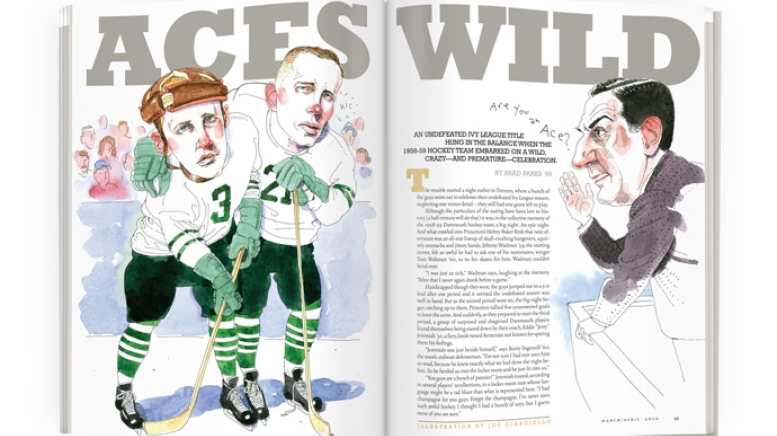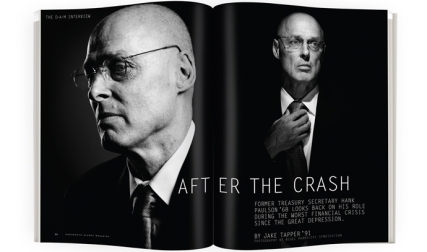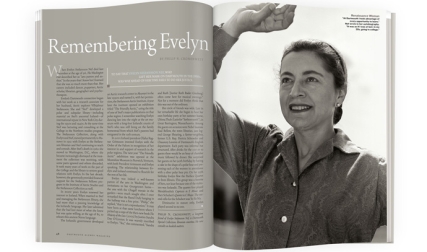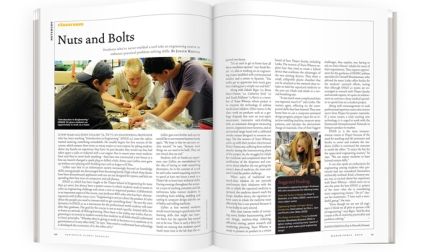The trouble started a night earlier in Trenton, where a bunch of the guys went out to celebrate their undefeated Ivy League season, neglecting one minor detail—they still had one game left to play.
Although the particulars of the outing have been lost to history (a half century will do that) it was, in the collective memory of the 1958-59 Dartmouth hockey team, a big night. An epic night. And what crawled into Princeton’s Hobey Baker Rink that next afternoon was an all-star lineup of skull-crushing hangovers, squirrely stomachs and jittery hands. Johnny Wadman ’59, the starting center, felt so awful he had to ask one of his teammates, winger Tom Wahman ’60, to tie his skates for him. Wadman couldn’t bend over.
“I was just so sick,” Wadman says, laughing at the memory. “After that I never again drank before a game.”
Handicapped though they were, the guys jumped out to a 5-0 lead after one period and it seemed the undefeated season was well in hand. But as the second period wore on, the big night began catching up to them. Princeton tallied five unanswered goals to knot the score. And suddenly, as they prepared to start the third period, a group of surprised and chagrined Dartmouth players found themselves being stared down by their coach, Eddie “Jerry” Jeremiah ’30, a fiery, hook-nosed Armenian not known for sparing them his feelings.
“Jeremiah was just beside himself,” says Rusty Ingersoll ’60, the team’s stalwart defenseman. “I’m not sure I had ever seen him so mad, because he knew exactly what we had done the night before. So he herded us into the locker room and he just lit into us.”
“You guys are a bunch of pansies!” Jeremiah roared, according to several players’ recollections, in a locker-room rant whose language might be a tad bluer than what is represented here. “I had champagne for you guys. Forget the champagne. I’ve never seen such awful hockey. I thought I had a bunch of aces, but I guess none of you are aces.”
Then he went around the room, challenging each player by asking, “Are you an ace? Are you an ace?” And when it became clear they didn’t know what he was talking about, Jeremiah explained it to them: “An ace,” he said, “is a guy who can tie one on the night before and still go out the next night and play the game of hockey the way it’s meant to be played!”
The boys in the locker room that night are now old men, 50 years having passed by in what sometimes feels like an eye-blink. And as the remaining members of the 1958-59 and 1959-60 teams prepared for a February reunion celebrating the 50th anniversary of their back-to-back Ivy League championships, they were busy swapping phone calls, e-mails and blog posts, recounting Jeremiah’s now-notorious “aces” speech—and a lot more.
They’ve found themselves recalling a simpler time when their lives consisted of hockey, classes and a group of fellows who would go on to become lifelong friends. They remember the long bus rides, drinking beer, playing cards or wagering pennies on a portable roulette wheel, laughing the whole time. They remember some of their superstitions, such as the sweatshirt Ingersoll never washed or how Jake Haertl ’61 always walked the back way to (now demolished) Davis Rink; or some of their traveling clothes, such as the obnoxious red sport coat worn by Chuck Ritchie ’60 and the ridiculous Tyrolean hat sported by Bob Moore ’61.
They remember the pranks and the hijinks, like when they would take to the streets of Boston or New Haven and walk lockstep, hip-to-butt, six or eight guys making like some human caterpillar, thinking they were simply hysterical, or the time at Yale when they convinced a yearbook photographer to take their picture because they were members of the “erg club,” or the time they arrived at Cornell late at night to find a janitor asleep with his broom, sprawled out on a sofa, and they started stacking lamps, chairs and tables on top of him.
“I don’t know if he was drunk or hungover or what,” says Haertl. “That guy must have had 500 pounds worth of stuff piled on him and he never woke up.”
Or they remember the small kindnesses and life-lessons from Jeremiah, the legendary coach with the iron-tough exterior and the cotton-soft heart. For Ryan Ostebo ’60, it was the coach’s constant encouragement that helped the defenseman overcome a confidence problem. For Ingersoll, it was being benched during a game against Brown for playing dirty hockey and then being told if he didn’t shape up he’d be off the team, a moment Ingersoll describes today as “a defining moment in my young life.” For Wahman, it was when he was in danger of flunking English and Jeremiah lined up a tutor, who turned out to be future NBA star Rudy LaRusso ’59.
“Here’s this guy from Brooklyn with all the ‘dese, dems and dose’ and I’m thinking, ‘This is the guy who’s going to teach me English?’ ” Wahman says. “But he did a great job and I got my gentleman’s C.”
Or, more simply, they remember what they achieved together: back-to-back Ivy League titles, a feat that Dartmouth has duplicated only once since that time (thanks to the 1978-79 and 1979-80 teams).
“It’s been a continuous memory for me for the last 50 years and it probably means as much now to me as it did then,” says Ostebo. “I take a great deal of inner satisfaction from what we were able to accomplish.”
That Dartmouth was even in the position to go undefeated that season was something of a surprise to the team, not to mention the rest of the Ivy League. Jeremiah-led Dartmouth teams had dominated the 1940s, winning a mythical national championship in 1941 and making it to the NCAA finals two other times. Then the 1950s saw a shift in the balance of power. The players from Massachusetts who put Dartmouth on the map spurned Hanover in favor of Boston-area schools. Jeremiah was still the same coach with a thousand catch-phrases, instructing players to “Take a smart, sneaky peak” or “Be cocky with confidence, not cocky with conceit” or perhaps most famously, “Look up and keep fighting.” But he wasn’t getting the same results.
So in a golden era for Dartmouth sports and coaches—with Bob Blackman (football), Doggie Julian (basketball) and Tony Lupien (baseball) in various stages of their Hall of Fame careers—Jeremiah found a new way to win. With the help of an alum in the Twin Cities, John Faegre ’32, Jeremiah became the first Ivy League coach to heavily recruit players from Minnesota. Within the span of a few years he had stocked his squad with tough, talented Midwesterners to complement the New Englanders who still found their way to Dartmouth. And though the smart money was still on Harvard, which had won the league five years in a row, Jeremiah had a hunch about his 1958-59 team. “It’s been many a moon since I’ve felt so hopeful and so optimistic about a team,” he wrote in his preseason bulletin.
Early on it appeared that hope might be short-lived, when Jeremiah heard from the team doctor that captain Rod Anderson ’59 would have to miss the season with knee trouble. The youngest of three hockey-playing brothers—the middle, Wendell Anderson, became governor of Minnesota—Anderson had led his high school team to a state championship and was Dartmouth’s best player. Jeremiah informed his normally soft-spoken captain of the diagnosis shortly before the first scrimmage. Anderson’s reaction, Jeremiah later noted, “was like pressing the button at Cape Canaveral.”
Anderson quickly left the locker room to have words with the doctor. The next thing the players saw was their captain returning, giving them a confident nod and lacing up his skates. He was going to tape up his knee and play. A tone had been set.
The team won its first regular season game against Colby, then went west for a four-game road trip to Minnesota. It was still somewhat unusual for a team from the east to make such a trip, and Dartmouth was dismantled, losing all four games by a combined 17 goals.
“We were just outplayed,” says Moore. “But I think in the long run it ended up being a good thing. There’s nothing like getting embarrassed like that to refocus a team.”
As the New Year dawned Dartmouth slowly began figuring itself out. The first line consisted of Anderson, the team’s undisputed leader, skating on one leg; Wahman, who played goalie as a sophomore and senior but in his junior year surprised everyone with his ability to play wing; and Wadman, the center, 134 pounds of heart and hustle who never backed down from a challenge.
“Johnny was a character,” Anderson says. “Just before the puck dropped for the opening face-off he’d always look up and say something mean to the opposing center like, ‘You’re ugly.’ ”
The second line of Mike Hollern ’60, Haertl and Moore—a junior and two sophomores—provided an unexpected scoring boost and was also adept at killing penalties. The defense, with Dirk Frankenberg ’59 in goal, was anchored by Ingersoll and Ostebo. They were opposites in many ways. The 6-3 Ostebo was all arms and legs, no more than 175 pounds. The 5-10 Ingersoll was stockier, playing at 190. But their skills complemented each other well. Ostebo was hellacious on the boards, and opponents quickly grew weary of elbows that seemed to come fresh from a pencil sharpener. Ingersoll, who set a conference record for penalty minutes that stood until the Ivy League switched to four-year eligibility, was a punishing open-ice body checker, a gleeful hitter who had absorbed Jeremiah’s many lessons about the intricacies of the trap check and executed them with devastating effect.
“Rusty would hit guys so hard they would drop to their knees and crawl off the ice,” remembers Haertl. “He was ferocious. He could see a guy with his head down and—baboom!—he would just croak them.”
It wasn’t until late January that Dartmouth established it was for real, beating Harvard at Davis Rink, spurred on by an enthusiastic home crowd that hung over the chicken wire netting strung above the boards and shook the old arena with its cheers. The victory ended a 16-game losing streak against the Crimson. During the post-game celebration Haertl dumped a bucket of water on his coach, presaging a ritual that has become commonplace in sports. “Sort of bringing the Connecticut River to Jeremiah instead of vice versa,” Jeremiah later noted.
Three weeks later Dartmouth had to prove beating Harvard was no fluke, this time in Cambridge. A contingent of 100 students made the trip town and they were, Jeremiah reported, “Tanzied-up”—Tanzi’s being the grocery store that sold the beer kegs back then. Harvard hadn’t lost a home Ivy League game since 1952, but even though the Dartmouth team was outshot 31-14, they still won 4-3, all but guaranteeing they would become champions.
But were they aces? It was still an open question heading into the final period against Princeton in the final Ivy League tilt of the year. The teams played scoreless for the first 12 minutes. In the 13th minute Wahman got a two-on-one breakaway, with Wadman, his center, trailing just behind saying, “With you, with you,” just as Jeremiah had taught.
“I was trying to turn the defenseman and make him commit with his right foot so I could give Wadman a clear shot,” recalls Wahman. “I kept backing that defenseman up, and I had Wadman behind me saying, ‘With you, with you.’ I backed that defenseman up until he was practically in the goal and finally he turned his foot. And then I was able to pass it to Wadman.”
And Wadman, that guy who had been too sick to tie his own skates before the game, slapped in the game-winner. He and his teammates held on through the final seven minutes to secure the victory and an undefeated season.
They were, after all, aces
Brad Parks is a freelance writer and author. His debut novel, Faces of the Gone (St. Martin’s Press), was published in December.




